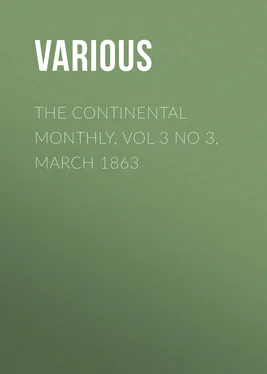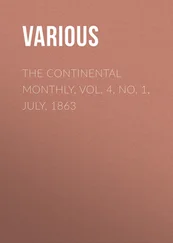Various - The Continental Monthly, Vol 3 No 3, March 1863
Здесь есть возможность читать онлайн «Various - The Continental Monthly, Vol 3 No 3, March 1863» — ознакомительный отрывок электронной книги совершенно бесплатно, а после прочтения отрывка купить полную версию. В некоторых случаях можно слушать аудио, скачать через торрент в формате fb2 и присутствует краткое содержание. Жанр: foreign_antique, periodic, Языкознание, Политика, foreign_edu, на английском языке. Описание произведения, (предисловие) а так же отзывы посетителей доступны на портале библиотеки ЛибКат.
- Название:The Continental Monthly, Vol 3 No 3, March 1863
- Автор:
- Жанр:
- Год:неизвестен
- ISBN:нет данных
- Рейтинг книги:5 / 5. Голосов: 1
-
Избранное:Добавить в избранное
- Отзывы:
-
Ваша оценка:
- 100
- 1
- 2
- 3
- 4
- 5
The Continental Monthly, Vol 3 No 3, March 1863: краткое содержание, описание и аннотация
Предлагаем к чтению аннотацию, описание, краткое содержание или предисловие (зависит от того, что написал сам автор книги «The Continental Monthly, Vol 3 No 3, March 1863»). Если вы не нашли необходимую информацию о книге — напишите в комментариях, мы постараемся отыскать её.
The Continental Monthly, Vol 3 No 3, March 1863 — читать онлайн ознакомительный отрывок
Ниже представлен текст книги, разбитый по страницам. Система сохранения места последней прочитанной страницы, позволяет с удобством читать онлайн бесплатно книгу «The Continental Monthly, Vol 3 No 3, March 1863», без необходимости каждый раз заново искать на чём Вы остановились. Поставьте закладку, и сможете в любой момент перейти на страницу, на которой закончили чтение.
Интервал:
Закладка:
Of course I am not going to tell the history of the great siege in the Crimea, for every child knows by heart the tale of the clambering fight up the Alma's steeps, of the withering volley that suddenly crashed out of the gray twilight on the hill of Inkerman, of the long months of starvation, of the final feu d'enfer , beneath which the Russian host crowded over the narrow bridge that saved them from their foe. But of the fatal charge of the Six Hundred I must speak, for I was one of them, and I have cursed its memory a thousand times.
I well remember that day—how restless I was the night before, and how I listened to the dropping shots on either side, hoping almost that one would find its way to my heart.
We were brigaded by daylight. Some manœuvres on an extensive scale were to be attempted, I believe, one of which was to outflank some batteries of field artillery by which we had suffered much loss. They were drawn up at the side and end of the valley of Balaklava, and we were at the other end, and were ordered, it has since been said in error, to charge down the valley upon them.
How beautiful the sun rose that day! The dewy odors from a thousand flowers came floating up from that green valley as he rolled away the mists from the mountain tops, and showed us the dusky masses far below, from which the shot came whizzing every now and then. Gods! how we exulted at the sight. Along our line rose a wild cheer, as our horses tugged and strained at their bits, and every man's bridle was drawn tight. Soon a puff of smoke came from a hillock near, and the stern command 'draw swords' ran along from troop to troop, as the bright steel flashed in the sunshine like a river of light. Then out pealed the trumpets, and away we went, amidst a storm of ringing harness, and clashing scabbards, and flying banners, and thundering hoofs that made the ground shake. On we dashed, straight across the valley, in front of a point-blank fire, that emptied many a saddle as we flew along, straight upon the mass of smoke and flame which hid those fatal batteries—straight at the gunners, dealing out wild blows upon them, while they fought with swords, or axes, or clubbed muskets, or gun spongers, or anything that could cut or strike a blow.
As for me, I only know that I was in the first line, and among the first in the mêlée; where my first blow lighted upon the bare head of a Russian, whose blood spouted high as I cut at him with all my force; for after that a mist came over my eyes, and I fought in the dark, and then came oblivion.
When I awoke to consciousness, which I did not for several days, I found that I was wounded, and had been in danger of my life, though I should most probably recover. As soon as I was strong enough to talk much, I was told that my bravery had been very conspicuous, and that I had been honorably mentioned in the order of the day. Four Russians, it seemed, had died by my hand, and being at last cut on the head by a sabre, I was with difficulty held on my horse when the retreat was sounded. I had raved, it also appeared, incessantly; but now the fever had left me. Good. It was fever, they thought, which had held possession of me. But those who said so did not know what power it was that nerved my arm, and then, having worked his devilish wile, flung me away like a broken toy. Fever! They did not know that it was a 'fever' that had cursed me for twelve long years.
But I got well, as those who were about me said, and, having been reported fit for duty, made my appearance at parade, and afterward, the same day, at mess.
My brother was dead. One day, while I lay ill, he and a party of his brother officers were idly chatting in one of the more advanced trenches, when a minié ball struck him, and he died without a word or groan. They carried him out, and he lies at the little graveyard at Scutari, with thousands of others who fell in the Great Siege. His sword and other relics had been kept for me, and among them was a portrait of Cousin Lucy, which he had worn next his heart. I should have to take it to her. The general in command had already written to her, with the news of her bereavement.
I was saying that I rejoined the mess. All my comrades congratulated me but one. He was a young fellow, recently exchanged from another regiment, who would one day wear the strawberry leaf upon his coronet—a cold, supercilious, prying puppy, whom I hated at once. When we were introduced, our mutual bow was studied in its cold formality—on his side so much so as to be almost insulting, considering the place and circumstances. To this day I believe that he, the only one of all there, had suspected me, and I felt that I must be perpetually on my guard against his curious glances. I was sure that one day we should have to strive for the mastery. And we did—sooner than I expected; for, as the colonel filled his glass, and, calling upon the rest to follow his example, drank a welcome to me back among them, this knave, sitting opposite at the time, fixed his eyes upon me as he lifted his glass to his lips, and did not drink. As our looks met, I knew that he mocked me, and I flung my wine in his face, and raved.
Those present forced me away, and took me to my tent, where they made me lie down. I was supposed to be delirious from weakness and the effects of my wound, and I heard them say, 'He has come out too soon; that wine he drank at dinner was too much for him.' Good again! It was the wine! 'But,' thought I, 'as soon as this arm shall be able to strike or thrust, I will have the life of that sneering devil, or he mine.' And I kept my word. I met him within ten days afterward, walking at some distance from the camp, quite alone, as I was myself.
'Good morning,' said he; 'you are about again, as I am glad to see.'
I said to him, 'Do you forget the time when I was out before?'
'Surely not,' said he; 'but I knew that you had been ill, and was not master of yourself.'
'And so forgave me?' I rejoined, in a passion.
'And so forgave,' said he; 'why not?'
'Then learn,' said I, 'that I was master of myself; that I am now; that you insulted me grossly; that the only words I have for you are—draw, sir, draw!'
'Stop!' he cried, as I drew my sword; 'pray come back with me to the camp. You are ill; pray, come back; I have no quarrel with you, believe me.'
But I struck him on the breast with my swordhilt, so that he nearly fell. Then he recovered himself, and, still crying out that he had no quarrel with me, drew and stood upon his guard, while I rushed upon him.
He was cool, and I furious. I believe he could have killed me easily if he had wished, but he only parried my rapid blows. At last, however, as I pressed him more closely, he grew paler, and began to fight in earnest. What then could he do against a madman? I bore him back, step by step, till a mass of rock stopped him; and there I kept him, with the hissing steel playing about his head, until he dropped upon one knee and his sword fell from his hand. Then I paused, waiting to see him die as I would a wounded hare, as die I knew he must, for I had pierced him with twenty wounds. He knelt thus, and looked, not at me, but at the setting sun; and then his head drooped and he rolled over, and was dead.
And as I wiped my sword on the grass, I shouted with glee.
Of course, I told no one. It was but another secret added to the many that had torn my heart and brain. Nor, when the body was found, stripped by camp followers, and supposed to be killed by a reconnoitring party of the enemy, did I betray myself by word or look.
At last the war was over, and we were ordered home. I bade farewell to the blue hills of the Crimea with secret joy, and as the shore faded from my sight, the memory of all that had happened to me during the Great Siege faded from my memory like a dream.
Читать дальшеИнтервал:
Закладка:
Похожие книги на «The Continental Monthly, Vol 3 No 3, March 1863»
Представляем Вашему вниманию похожие книги на «The Continental Monthly, Vol 3 No 3, March 1863» списком для выбора. Мы отобрали схожую по названию и смыслу литературу в надежде предоставить читателям больше вариантов отыскать новые, интересные, ещё непрочитанные произведения.
Обсуждение, отзывы о книге «The Continental Monthly, Vol 3 No 3, March 1863» и просто собственные мнения читателей. Оставьте ваши комментарии, напишите, что Вы думаете о произведении, его смысле или главных героях. Укажите что конкретно понравилось, а что нет, и почему Вы так считаете.












